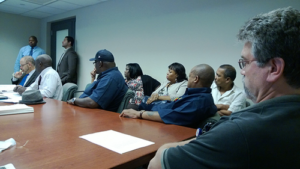 If your union is not willing to help you fight your termination or discrimination claim, you may still be able to bring a case in court. You may be able to file a wrongful termination lawsuit in court even if you lose your grievance at union arbitration. This is because union grievances are governed by the union agreement (CBA – collective bargaining agreement). Howevrer, your legal right to be free from discrimination, retaliation, etc.., is governed by a different set of rules – the State and Federal laws, such as FEHA (Fair Employment and Housing Act), ADA (Americans With Disabilities Act), California Labor Code and other state and federal laws.
If your union is not willing to help you fight your termination or discrimination claim, you may still be able to bring a case in court. You may be able to file a wrongful termination lawsuit in court even if you lose your grievance at union arbitration. This is because union grievances are governed by the union agreement (CBA – collective bargaining agreement). Howevrer, your legal right to be free from discrimination, retaliation, etc.., is governed by a different set of rules – the State and Federal laws, such as FEHA (Fair Employment and Housing Act), ADA (Americans With Disabilities Act), California Labor Code and other state and federal laws.
Under the law, a union member’s discrimination claim can only be handled by a union grievance and arbitration if two conditions are met: (1) the agreement to do so must be “clear and unmistakable” and (2) the procedures for the arbitration must allow for the full litigation and fair adjudication of the FEHA (California Fair Employment and Housing) claim. (Camagro v California Portland Cement Co. (2001)). Generally, most Union agreements do not cover FEHA claims for discrimination, harassment and retaliation, let alone provide for full litigation of such claims, like a court case would. These union agreements only cover discipline and just cause termination rights.
If an MOU (Memorandum of Understanding) provides for general prohibition against workplace discrimination without stating that all discrimination claims are subject to union arbitration, the employee will be free to file a discrimination case in court. This is regardless of the outcome of the union grievance / arbitration.
The above information is very useful in situations where the employer is playing gotcha with an employee, trying to get rid of a worker for some petty reason, when the true reason for termination is unlawful discrimination. Here is a common example: let’s say you have been employed with the company for 10 years as a mechanic. You have been doing a good job and received good performance reviews. You got injured at work, filed a workers comp claim, and went on FMLA or some other type of medical leave or disability leave. Shortly after you return, the employer started micromanaging you and watching your every move. Then, you make some kind mistake – you break a tool or raise you voice momentarily at a co-worker or you are 10 minutes late for your shift.
The employer suspends you pending investigation and then pushes for your termination. You file a grievance. The subject of that grievance is only whether the discipline imposed on you is just and whether there is sufficient cause for termination. Let’s say you lose that grievance and your termination is upheld. You still have the opportunity to file a lawsuit for disability discrimination in court. Although only the union arbitration can reverse your termination and force the employer to take you back to work, you may still be able to recover compensation for the loss of wages and emotional distress that the employer caused you, if there is sufficient evidence that the reason or one of the reasons for your termination was your injury, work comp filing or using medical leave.
Employees often receive the following incorrect advice – they are told that they have to wait for their union grievance to be resolved one way or the other before they can file a case in court. This is not true. An employee can and in many cases should file a court case while his grievance is pending, because they two processes are independent of each other, and there are often strategic advantages to pursuing both, including creating more pressure on the employer to settle the dispute by making them work and spend money on both claims.
Please watch the video below to better understand your rights under the law and under the union bargaining agreement, if you believe you have been wrongfully terminated: